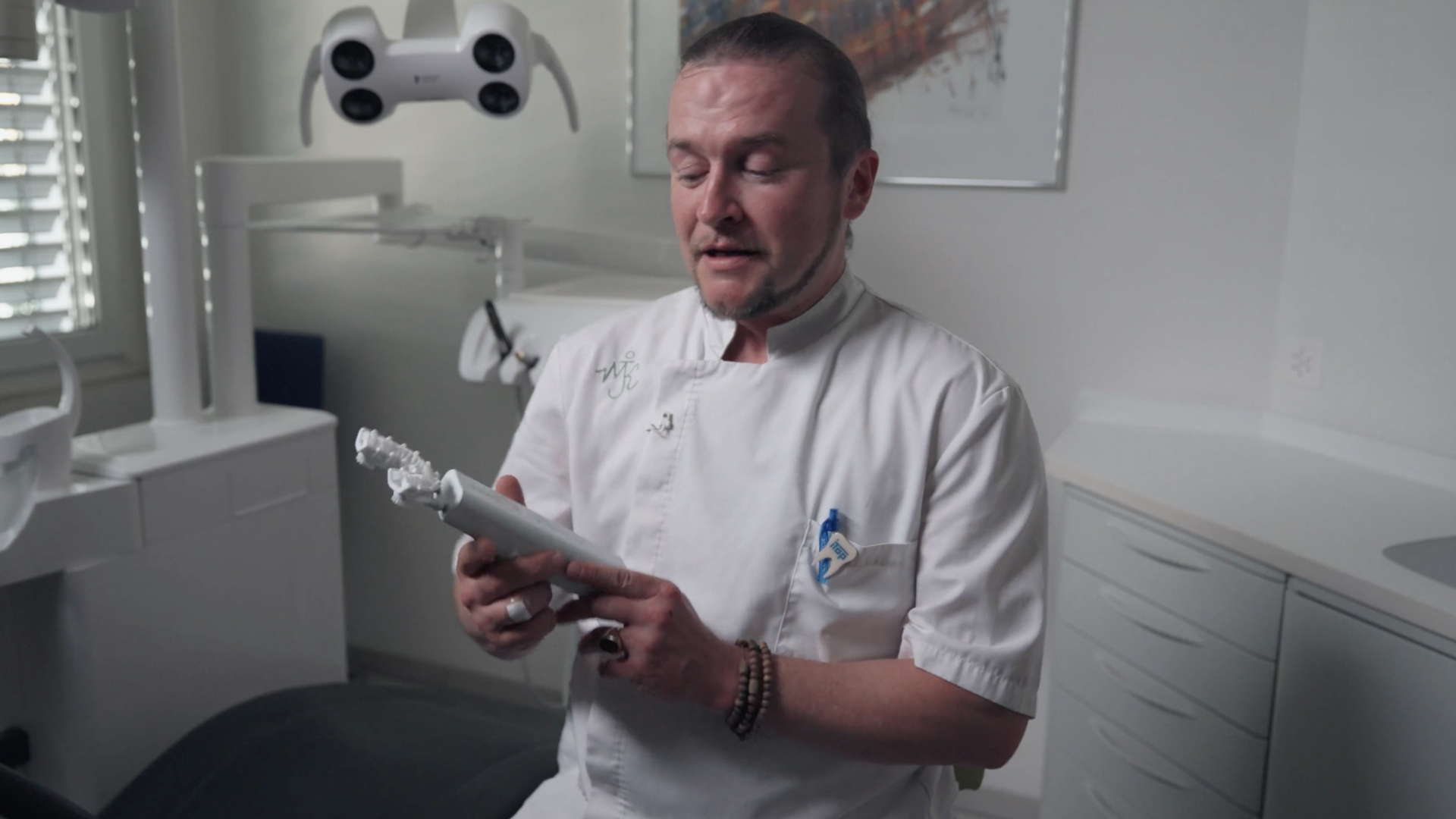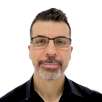A long-awaited solution
For those dealing with a physical or mental disability, effective brushing can pose a challenge. They are often forced to rely on a caregiver or family member to clean their teeth for them, or they do the brushing themselves with a subpar technique. Either option ends up compromising the oral health of these patients, exacerbated by a lack of understanding of proper brushing techniques and areas to focus on, particularly in the case of implants or orthodontic appliances. Exact numbers are difficult to come by, but according to one study, an estimated 88% of individuals with a disability suffer from dental problems. More than anything, this staggering figure reflects the need for a tailored solution.
The Israeli start-up DentFreak conceived the Samba brush specifically to tackle this health disparity. Eight years of extensive development later, manufacturer Curaprox released it to the market. “Samba was developed with the conviction that everyone deserves a healthy mouth, and that disability should not interfere with oral hygiene,” explained Samba inventor Eran Eyal, founder and CEO of DentFreak.
“Disability should not interfere with oral hygiene.”—Eran Eyal, founder and CEO of DentFreak
The brush’s innovative design means that, even without manual dexterity, people with disabilities can take care of their oral health independently. “They no longer need help,” said Swiss dentist and co-developer Dr Michael Keller. “They just need this tool and then they can look after their oral health without effort,” he explained.
Perfect cleaning, with or without disability
Samba’s secret lies in its perfect reproduction of toothbrushing with a superior technique. It makes up for the various challenges faced by individuals with disabilities, such as fatigue and compromised motor skills, which impact grip, pressure and control. Samba has a large handle that is easy to hold on to and employs brush heads that move with a dynamic brushing motion at a predetermined pressure. The bristles embrace the teeth in a U-shape and move along the teeth and gingival margin thanks to an ingenious application of mechanics. Biofilm removal is achieved by a pioneering combination of low- and high-frequency oscillations.
A major difference to regular brushing is the short time it takes Samba to clean all the teeth. It cleans fast: 30 seconds per arch. Whereas a traditional toothbrush is only able to clean one tooth surface at a time, Samba can clean 36 surfaces simultaneously. The brush features 12,900 soft bristles, mainly grouped into 17 micro-brushes, that clean every tooth surface and groove at once. The resulting deep clean is one that few patients are likely to achieve and makes the brush a game-changer for any patient, regardless of whether they have a disability or not. For those patients with a disability, however, it can be a life changer.
More information about the Samba toothbrush can be found here.



 Austria / Österreich
Austria / Österreich
 Bosnia and Herzegovina / Босна и Херцеговина
Bosnia and Herzegovina / Босна и Херцеговина
 Bulgaria / България
Bulgaria / България
 Croatia / Hrvatska
Croatia / Hrvatska
 Czech Republic & Slovakia / Česká republika & Slovensko
Czech Republic & Slovakia / Česká republika & Slovensko
 France / France
France / France
 Germany / Deutschland
Germany / Deutschland
 Greece / ΕΛΛΑΔΑ
Greece / ΕΛΛΑΔΑ
 Italy / Italia
Italy / Italia
 Netherlands / Nederland
Netherlands / Nederland
 Nordic / Nordic
Nordic / Nordic
 Poland / Polska
Poland / Polska
 Portugal / Portugal
Portugal / Portugal
 Romania & Moldova / România & Moldova
Romania & Moldova / România & Moldova
 Slovenia / Slovenija
Slovenia / Slovenija
 Serbia & Montenegro / Србија и Црна Гора
Serbia & Montenegro / Србија и Црна Гора
 Spain / España
Spain / España
 Switzerland / Schweiz
Switzerland / Schweiz
 Turkey / Türkiye
Turkey / Türkiye
 UK & Ireland / UK & Ireland
UK & Ireland / UK & Ireland
 International / International
International / International
 Brazil / Brasil
Brazil / Brasil
 Canada / Canada
Canada / Canada
 Latin America / Latinoamérica
Latin America / Latinoamérica
 China / 中国
China / 中国
 India / भारत गणराज्य
India / भारत गणराज्य
 Japan / 日本
Japan / 日本
 Pakistan / Pākistān
Pakistan / Pākistān
 Vietnam / Việt Nam
Vietnam / Việt Nam
 ASEAN / ASEAN
ASEAN / ASEAN
 Israel / מְדִינַת יִשְׂרָאֵל
Israel / מְדִינַת יִשְׂרָאֵל
 Algeria, Morocco & Tunisia / الجزائر والمغرب وتونس
Algeria, Morocco & Tunisia / الجزائر والمغرب وتونس
 Middle East / Middle East
Middle East / Middle East
:sharpen(level=0):output(format=jpeg)/up/dt/2024/07/Study-evaluates-primary-personality-types-among-dental-students.jpg)
:sharpen(level=0):output(format=jpeg)/up/dt/2024/07/Shutterstock_2330040761.jpg)
:sharpen(level=0):output(format=jpeg)/up/dt/2024/07/Our-commitment-to-digital-dentistry-is-a-cornerstone-of-our-strategy.jpg)
:sharpen(level=0):output(format=jpeg)/up/dt/2024/07/University-teams-line-up-for-Dental-Olympics-2024.jpg)
:sharpen(level=0):output(format=jpeg)/up/dt/2024/07/website_Schein.jpg)








:sharpen(level=0):output(format=png)/up/dt/2013/03/LM-Dental.png)
:sharpen(level=0):output(format=png)/up/dt/2011/11/ITI-LOGO.png)
:sharpen(level=0):output(format=png)/up/dt/2022/10/DMP-logo-2020_end.png)
:sharpen(level=0):output(format=png)/up/dt/2023/06/Align_logo.png)
:sharpen(level=0):output(format=png)/up/dt/2022/01/Straumann_Logo_neu-.png)
:sharpen(level=0):output(format=png)/up/dt/2022/06/RS_logo-2024.png)
:sharpen(level=0):output(format=jpeg)/up/dt/e-papers/330729/1.jpg)
:sharpen(level=0):output(format=jpeg)/up/dt/e-papers/330727/1.jpg)
:sharpen(level=0):output(format=jpeg)/up/dt/e-papers/330725/1.jpg)
:sharpen(level=0):output(format=jpeg)/up/dt/e-papers/339526/1.jpg)
:sharpen(level=0):output(format=jpeg)/up/dt/e-papers/339524/1.jpg)
:sharpen(level=0):output(format=jpeg)/up/dt/e-papers/325039/1.jpg)
:sharpen(level=0):output(format=png)/up/dt/2024/05/Curaden_Logo_RGB1.png)
:sharpen(level=0):output(format=jpeg)/up/dt/2024/02/At-last-A-fully-robotic-toothbrush-for-disabled-patients.jpg)
:sharpen(level=0):output(format=gif)/wp-content/themes/dt/images/company-photo.gif)

:sharpen(level=0):output(format=jpeg)/up/dt/2023/07/Curaprox-advances-its-research-and-development-efforts-in-the-US.jpg)
:sharpen(level=0):output(format=jpeg)/up/dt/2023/06/230611_Benjamin-Binot.jpg)
:sharpen(level=0):output(format=jpeg)/up/dt/2023/02/Curaden_Curaprox_DTI_Hydrosonic_Pro_Article_1920x1080_740_23.jpg)
:sharpen(level=0):output(format=jpeg)/up/dt/2024/02/Keeping-dental-staff-healthy-during-the-flu-season.jpg)
:sharpen(level=0):output(format=jpeg)/up/dt/2023/10/Curaden_Perio-Plus-Regenerate_1920x1080.jpg)
:sharpen(level=0):output(format=jpeg)/up/dt/2023/11/Curaden_Curaprox_Hydrosonic_pro_article-image.jpg)
:sharpen(level=0):output(format=jpeg)/up/dt/2023/03/Interview-with-Stephen-Mueller-edited.jpg)









:sharpen(level=0):output(format=jpeg)/up/dt/2019/07/jiri-sedelmayer.jpg)
![Towards a healthy mouth with [BE YOU.] Towards a healthy mouth with [BE YOU.]](https://i.tribune-group.com/0001/ac6052f4/resize-crop(w=413;h=232):sharpen(level=0):output(format=jpeg)/up/dt/2018/05/Overview_Design3-1.jpg)
:sharpen(level=0):output(format=jpeg)/up/dt/e-papers/330727/1.jpg)
:sharpen(level=0):output(format=jpeg)/up/dt/e-papers/330725/1.jpg)
:sharpen(level=0):output(format=jpeg)/up/dt/e-papers/339526/1.jpg)
:sharpen(level=0):output(format=jpeg)/up/dt/e-papers/339524/1.jpg)
:sharpen(level=0):output(format=jpeg)/up/dt/e-papers/325039/1.jpg)
:sharpen(level=0):output(format=jpeg)/up/dt/e-papers/330729/1.jpg)
:sharpen(level=0):output(format=jpeg)/up/dt/e-papers/330729/2.jpg)
:sharpen(level=0):output(format=jpeg)/wp-content/themes/dt/images/3dprinting-banner.jpg)
:sharpen(level=0):output(format=jpeg)/wp-content/themes/dt/images/aligners-banner.jpg)
:sharpen(level=0):output(format=jpeg)/wp-content/themes/dt/images/covid-banner.jpg)
:sharpen(level=0):output(format=jpeg)/wp-content/themes/dt/images/roots-banner-2024.jpg)
To post a reply please login or register